OCZ’s Vertex Limited Edition Review & SSD State of the Union
by Anand Lal Shimpi on February 19, 2010 12:00 AM EST- Posted in
- Storage
Overall System Performance using PCMark Vantage
Next up is PCMark Vantage, another system-wide performance suite. For those of you who aren’t familiar with PCMark Vantage, it ends up being the most real-world-like hard drive test I can come up with. It runs things like application launches, file searches, web browsing, contacts searching, video playback, photo editing and other completely mundane but real-world tasks. I’ve described the benchmark in great detail before but if you’d like to read up on what it does in particular, take a look at Futuremark’s whitepaper on the benchmark; it’s not perfect, but it’s good enough to be a member of a comprehensive storage benchmark suite. Any performance impacts here would most likely be reflected in the real world.
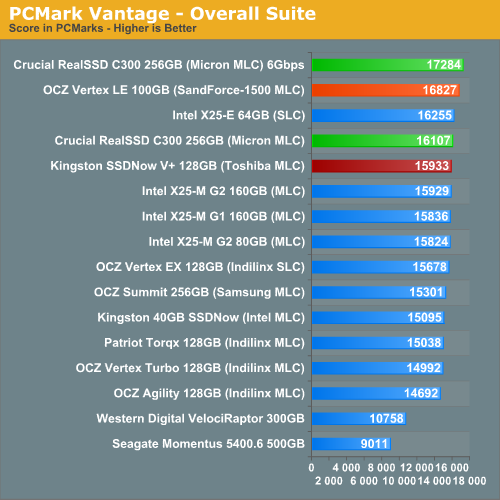
The performance differences under PCMark Vantage are minimal between any halfway decent SSDs. This actually mimicks what you'll see in most real world usage with these drives. It's the same reason I don't use individual application launch tests to compare performance - all of these drives perform about the same. The being said, the Vertex LE is technically the fastest 3Gbps drive here, behind only the C300 connected to a 6Gbps controller. The new Kingston drive does very well here.
The overall standings are something you'll see repeated in most of the subtests. Crucial and OCZ trading blows at the top, with the 6Gbps controller often giving Crucial the slight edge.
The memories suite includes a test involving importing pictures into Windows Photo Gallery and editing them, a fairly benign task that easily falls into the category of being very influenced by disk performance.
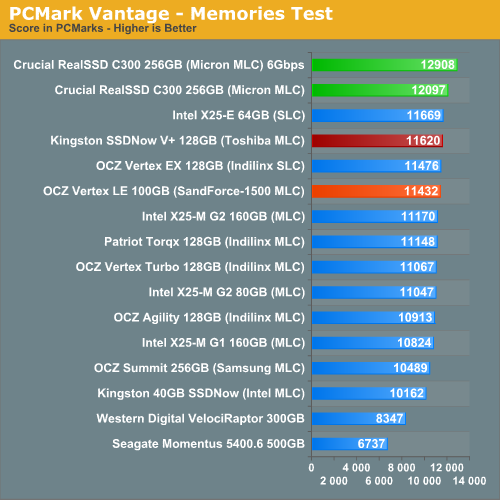
The TV and Movies tests focus on on video transcoding which is mostly CPU bound, but one of the tests involves Windows Media Center which tends to be disk bound.
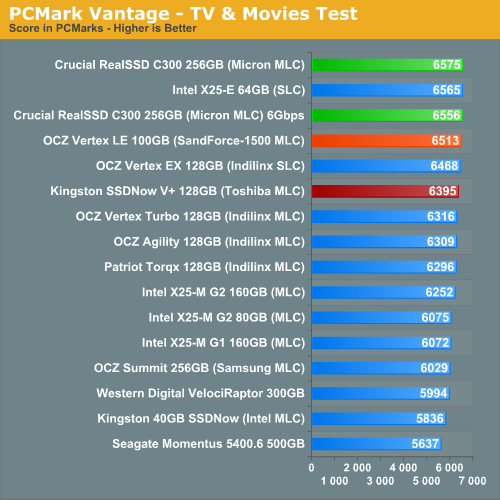
The gaming tests are very well suited to SSDs since they spend a good portion of their time focusing on reading textures and loading level data. All of the SSDs dominate here, but as you'll see later on in my gaming tests the benefits of an SSD really vary depending on the game. Take these results as a best case scenario of what can happen, not the norm.
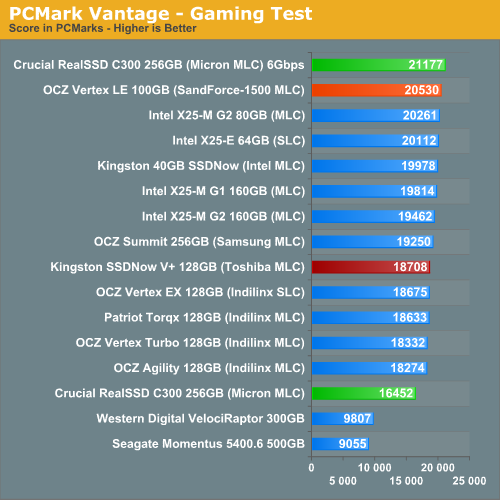
In the Music suite the main test is a multitasking scenario: the test simulates surfing the web in IE7, transcoding an audio file and adding music to Windows Media Player (the most disk intensive portion of the test).
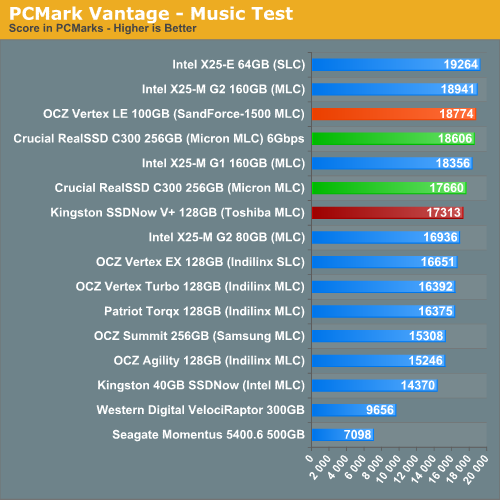
The Communications suite is made up of two tests, both involving light multitasking. The first test simulates data encryption/decryption while running message rules in Windows Mail. The second test simulates web surfing (including opening/closing tabs) in IE7, data decryption and running Windows Defender.
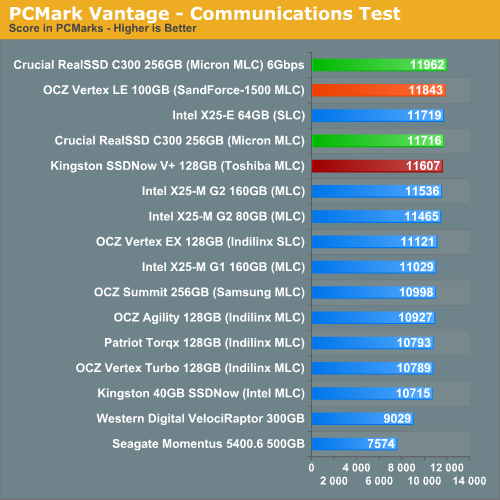
I love PCMark's Productivity test; in this test there are four tasks going on at once, searching through Windows contacts, searching through Windows Mail, browsing multiple webpages in IE7 and loading applications. This is as real world of a scenario as you get and it happens to be representative of one of the most frustrating HDD usage models - trying to do multiple things at once. There's nothing more annoying than trying to launch a simple application while you're doing other things in the background and have the load take forever.
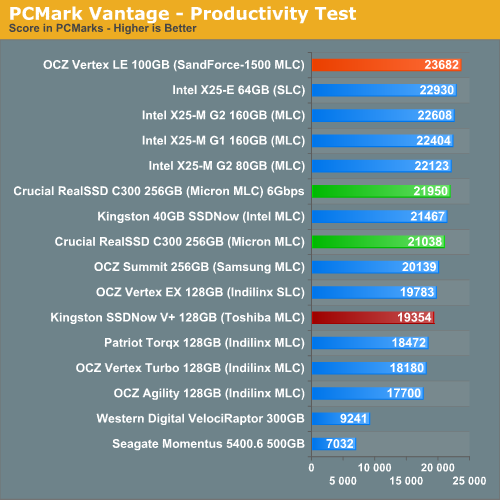
There's just no replacement for IOPS, and the Vertex LE has ample to spare. This is one of the only cases in PCMark Vantage where the SandForce-1500 based drive pulls clearly ahead of the C300.
The final PCMark Vantage suite is HDD specific and this is where you'll see the biggest differences between the drives:
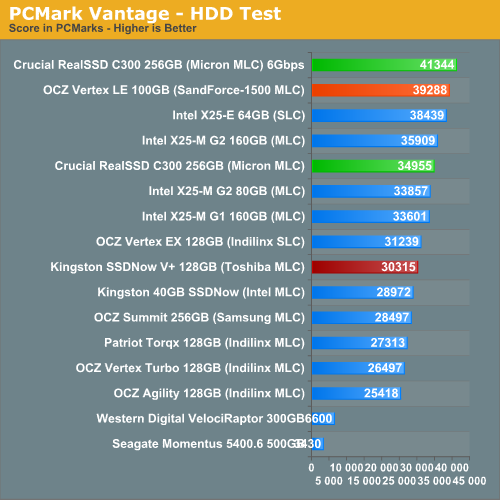
The HDD test is purely I/O bound and connected to a 3Gbps controller, the Vertex LE is clearly the fastest thing here. Around 9% faster than Intel's X25-M or Crucial's RealSSD C300. Pair the C300 with a 6Gbps controller however and it's the unequivocal performance leader. If you have a motherboard with 6Gbps SATA on-board, this is the SSD you'll want.










83 Comments
View All Comments
mindless1 - Friday, February 19, 2010 - link
I meant the above within the context of it using a PCIe, otherwise the SATA600 link would clearly be a bottleneck.mckirkus - Friday, February 19, 2010 - link
I know what you're saying. But I'm wondering what PCMark scores look like when you remove drive IO as the bottleneck. If the best SSDs are scoring 20,000 would the same system with no disk bottleneck score 25,000? 30?In other words, with only SSD scores we're still not sure how close we are to removing the drive bottleneck in system performance. IMO this is an important question and the answer would give these SSD scores some context.
overzealot - Monday, February 22, 2010 - link
I just tried out PCmark on a 2gb ramdrive. My q6600 (stock) had 1 core maxed from about 20% through each test, and got a score of 362,471 in the HDD test. That's with DDR800 folks.I'm guessing all the results would be CPU bound so my system is really not the best place to test it.
overzealot - Monday, February 22, 2010 - link
Physical Memory: 4 GB (2GB Ramdisk, so really 2)Graphics card: ATI Radeon HD 5770
Operating System: Windows 7 Ultimate (6.1.7600) 64-bit
Full suite results:
PCMark 6,566.0 PCMarks
Memories 5,596.0
TV and Movies 4,326.0
Gaming 5,133.0
Music 6,085.0
Communications 5,948.0
Productivity 6,242.0
HDD 345,794.0
The scores for everything would be way too long, here's the HDD results:
HDD - Windows Defender 1,797,924,224.0 B/s
HDD - gaming 2,064,242,048.0 B/s
HDD - importing pictures to Wind 1,810,203,648.0 B/s
HDD - Windows Vista startup 2,053,050,752.0 B/s
HDD - video editing using Window 1,549,093,504.0 B/s
HDD - Windows Media Center 1,607,108,864.0 B/s
HDD - adding music to Windows Me 1,423,892,096.0 B/s
HDD - application loading 1,355,910,784.0 B/s
HDtach rates it at 3GB/s.
jimhsu - Saturday, February 20, 2010 - link
There will also be an I/O bottleneck unless the entire dataset can fit directly onto the CPU. The RAM/CPU bottleneck is the Von Neumann bottleneck which is a well known one in computer science (time/space tradeoffs). It's just what's the point at which the bottleneck ceases to become a user issue...srue - Friday, February 19, 2010 - link
"Despite early messaging to press, the 40GB Kingston SSDNow V Series Boot Drive will never get official TRIM support for Kingston. Luckily some adventurous folks have figured out a way to trick Intel’s firmware updater into thinking Kingston’s drive is worthy of such a gift."That first sentence upsets me because I purchased the drive believing TRIM support would eventually come. Granted, I probably would have done the same knowing what I know now, but I thought I was getting a better value.
Does anyone have a link to the trick mentioned in the second sentence?
Glenn - Sunday, February 21, 2010 - link
Here ya go.http://www.overclock.net/ssd/656984-how-get-your-k...">http://www.overclock.net/ssd/656984-how...our-king...
I did this last week and it works great.
srue - Friday, February 19, 2010 - link
I found the instructions on overclock.net.mschira - Friday, February 19, 2010 - link
So I think I would rather go with an intel X25-MBy the way, what do you guys reckon are two X25-M 80Gb connected to the Intel Motherboard Raid in Raid 0 faster than a X25-M 160Gb?
Cheers
M.
leexgx - Saturday, February 20, 2010 - link
RAID 0 = no Trim support (maybe get TRIM support)160GB SSD would require no fussing to keep the drive tidy (with windows 7 that is standard drivers in AHCI mode) it stay at its advertised speeds as long as the Chipset driver was not installed or the intel matrix driver was Not installed
i give up for the most part commenting about how pointless RAID 0 with an SSD is, all you get is more data rate speed that you not even notice (unless your messing with Very big files 5-10GB but you lose TRIM so it degrade fast if you Write that much data a lot, One drive would still be faster) SSDs are about 2x data rate (a lot focus on this to much when its random you should be looking at ), 30x random data rate faster or more and the IOPS is 50x faster then an HDD (normally)
RAID + SSD = Fast for about an week or month then it be slower then 1 SSD